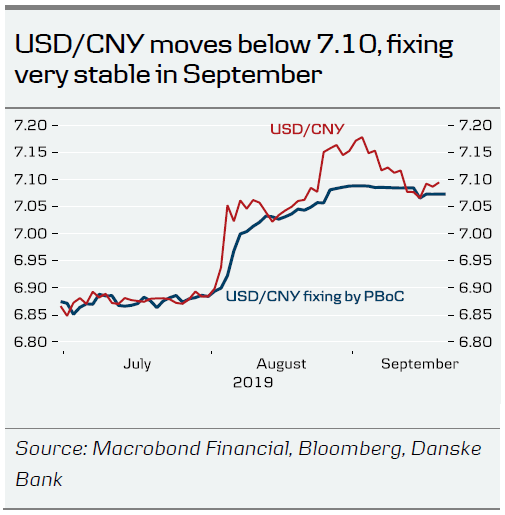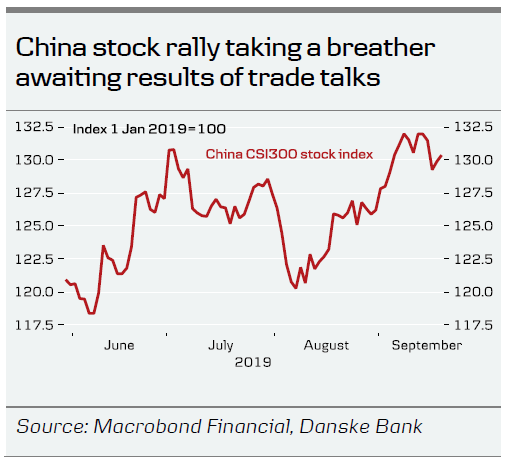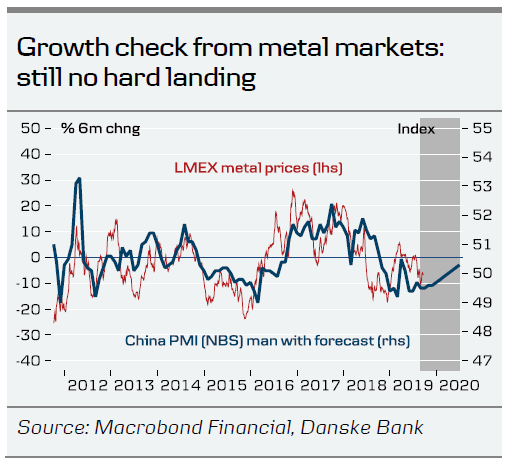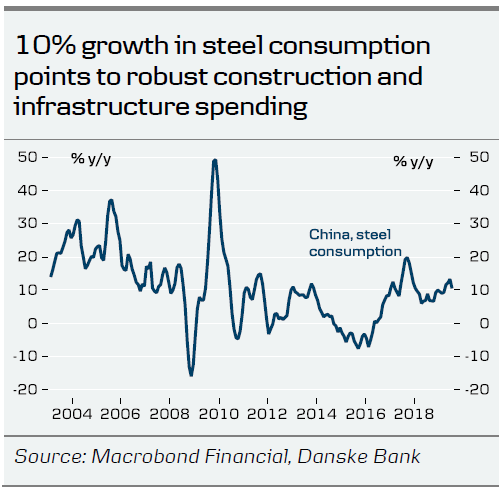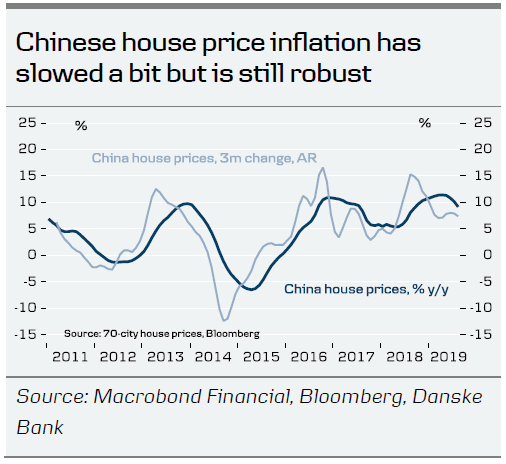- Lower-level officials meet in Washington. Small interim deal a possibility in October but real break-through is hard to envision at this stage.
- CNY strengthens ahead of trade talks where currency is likely to be on the agenda.
- Huawei offers to sell its 5G technology to Western companies.
Trump warns China of ‘toughest trade deal ever’ if they wait
Speaking to reporters this week US President Donald Trump stated that ‘if it’s after the election, it’ll be the toughest deal anybody’s ever had to make from the stand point of China ‘ and ‘China knows that ‘. However, at the same time Politico reported that Trump’s advisers are rushing to find an escape hatch for coming tariff increases as concern is rising over slowing of US growth going into 2020. It suggests that Trump’s pain threshold is not as big as he wants it to seem.
Deputy level trade talks started in Washington this week making preparations for high-level talks negotiations in the first half of October – ahead of Trump’s scheduled tariff hike on 15 October. A key focus in the talks is Chinese purchases of agricultural goods but intellectual property, forced technology transfer and currency issues are also on the agenda. The two teams may lay the ground for an interim trade deal in October, which could include a restart of Chinese purchases of agricultural goods in exchange for Trump delaying and/or reducing some tariffs. Changes to intellectual property rights is also said to be on the table for such an interim deal.
However, a US business lobbyist was sceptical of an interim deal after a meeting with US Trade Representative Robert Lighthizer, one of the top negotiators and a China hawk. Tom Donahue, chief executive of the US Chamber of Commerce, said he had detected a desire for de-escalation but that Lighthizer had stressed ‘the extraordinary challenge ‘ of reaching a deal that would cover thorny issues like protection of US intellectual property. Global Times editor Hu Xijin tweeted on Thursday that ‘Many US officials easily misread China’s goodwill, think it shows Beijing’s weakness. China doesn’t like talking tough ahead of negotiations, but I know China is not as anxious to reach a deal as the US side thought .’ Hu Xijin normally has a good sense of the Chinese position.
A US Congressional bill ‘Hong Kong Human Rights and Democracy Act of 2019’ this week added to the list of tensions between the US and China . China on Thursday strongly urged a withdrawal of the bill and foreign ministry spokesperson Geng Shuang stated that the US was ‘brutally interfering in China’s internal affairs ‘. China may keep the issue separate from the trade talks but negative sentiment could make it harder to sell a trade deal internally for Chinese trade negotiators.
Comment: An interim deal could be within reach because both sides seem to have an interest in this. Such a deal could include China buying some agricultural goods again in return for a further delay in tariff rates while kicking the can down the road on the thorny issues. However, the two sides would need to agree on how much China needs to buy, which might not be easy. The stop on agriculture purchases may be the strongest card China holds in the trade war. It causes pain for farmers in key swing states that Trump will need to win to be re-elected as president. Farmers are increasingly impatient as the pain from the trade war drags out. Many also express worries about what the trade war is doing to their opportunities in China in the long term if the US is no longer seen as a reliable supplier.
Why make an interim deal? On the US side the White House is occupied with how to keep the economy strong in 2020 ahead of the election. The fiscal stimulus that boosted growth in 2018 is fizzling out and Trump’s hands are tied in Congress with a Democratic party that is unlikely to give him much help to lift the economy one more time. On monetary stimulus his faith is in the hands of the Fed, which he blames on a more or less daily basis. But his hands are tied here too. At the same time higher tariffs on consumer goods from China in December will work as a tax hike and add another headwind to the US economy. Trump could therefore use an excuse to not raise those tariffs in December. On China’s side an interim deal would help avert even more escalation. China could also use imported pork from the US given the crisis with African swine fever.
An interim deal would be good for market sentiment as it lowers the tail risk of full blown economic war. But it does not solve the thorny issues that separated the two sides in May. We believe there is still a long way to a real deal, but the closer we get to the election next year the higher the probability that Trump will compromise and meet China half way.
CNY strengthens below 7.10 vs USD ahead of trade talks
USD/CNY moved below 7.10 going into this week as the trade war risk premium came down. The cross is now closer to where the fixing has been throughout September. The stability of the fixing in September just below 7.10 has sent a signal that the PBoC does not want the currency to weaken further, at least for now.
Comment: We look for USD/CNY to move broadly sideways in the short term. China probably wants to see CNY stabilise ahead of the trade talks in order to keep things calm on sensitive issues. Our 6M forecast is still 7.20 on the back of persisting trade tensions.
Huawei offers technology transfer to the West
In an interview with New York Times’ columnist Thomas Friedman, the founder of Huawei Ren Zhengfei said the company is ‘open to sharing our 5G technologies and techniques with US companies, so that they can build their own 5G industry‘. Ren said the buyer would be able to alter the code to show that there are no back doors. ‘The US side has to accept us at some level for that to happen’ he added. Huawei is on a blacklist restricting US companies from trading with Huawei. A temporary exemption expires on 19 November.
Comment: The move is a new attempt to tell the US that Huawei would like to work on finding a solution to the distrust. It would also mark a new era of technology transfer going the other way from China to the West and not only the other way. Huawei is to some extent used as a bargaining chip by Trump in the US-China trade talks. But he faces stiff resistance from Congress in opening up for exports to Huawei again as part of a trade deal.
Other China news this week
House price inflation remained solid in August (see chart) and construction spending was the strongest in four months. Housing is one of the supportive pillars for growth currently.
Shanghai is the first city in China to allow driver-less cars.
Chinese sovereign wealth fund CIC says it is cautious of investments in the US.

